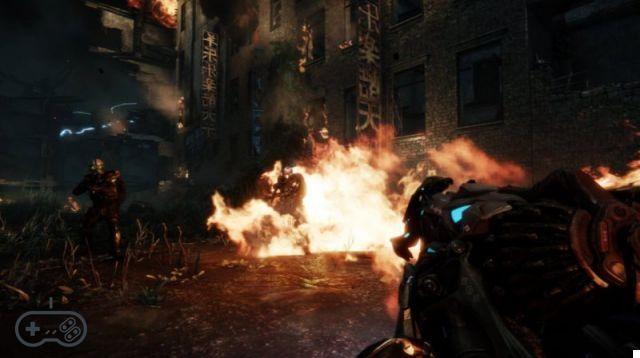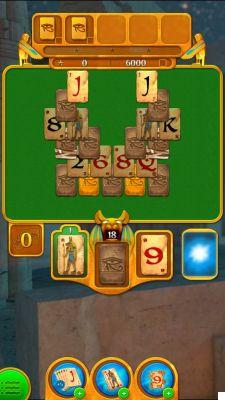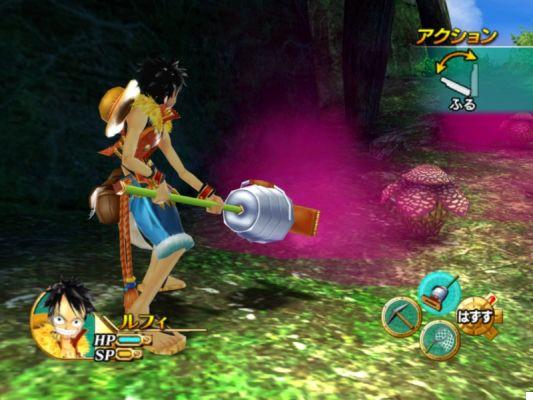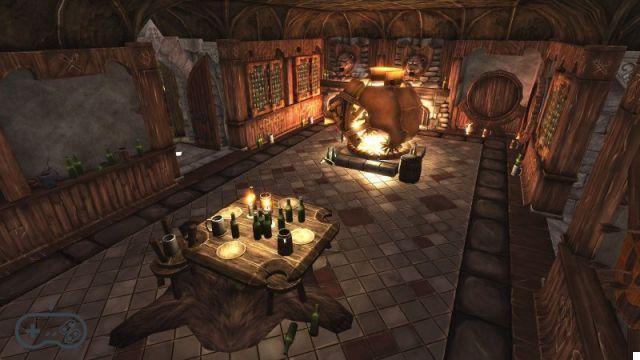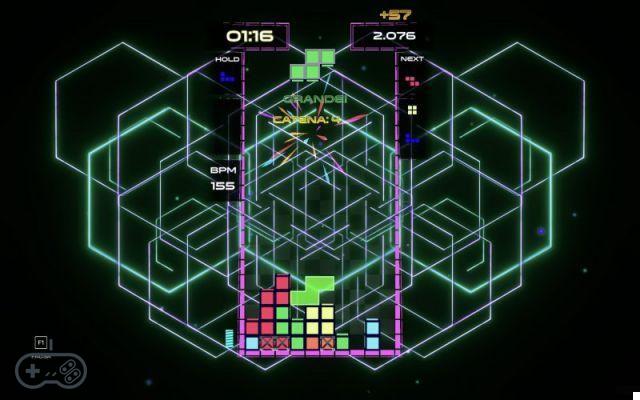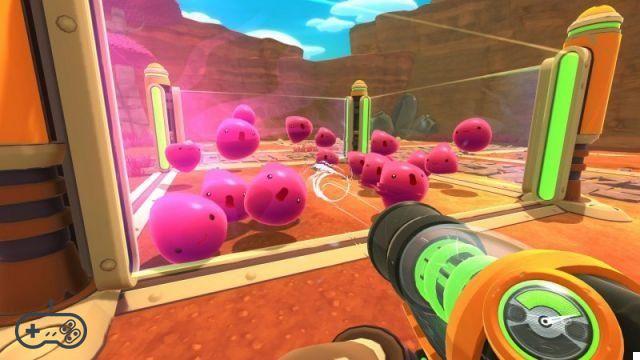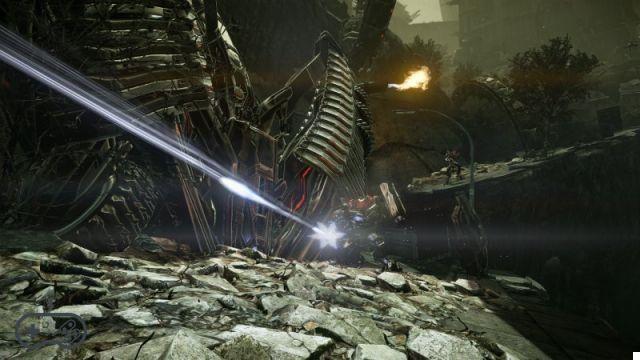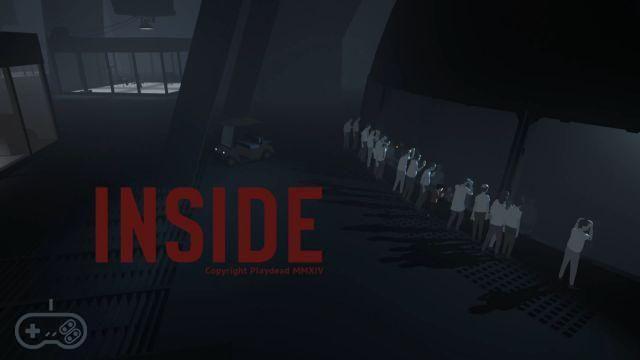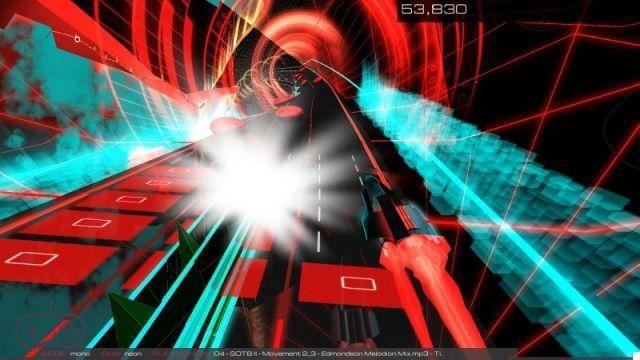We are on a distant world, now close to collapse. For centuries the population has made immense sacrifices to prepare an expedition to another planet, made up mostly of water, where they can move to re-establish their civilization, provided that conditions prove favorable. Mei, the protagonist of the adventure, is a scout, that is, one of the people selected for the vital mission. For years she has been trained to survive in the most adverse conditions, receiving all the knowledge necessary to face the challenge.
Of course she will not be alone: with her there will be an entire team of highly trained people, including technicians, doctors and operations directors. On the day of departure, ours leaves her home, greets her family and makes a last trip to her planet, before being asleep for a thousand years in a state of cryogenic sleep on the spaceship that will take her to what could become her own. new home. Or the grave of his people's hopes.
This in a nutshell the premise of this title born from a collaboration between Superbrothers and Pine Scented: here is the JETT review: The Far Shore.
Hit the JETT
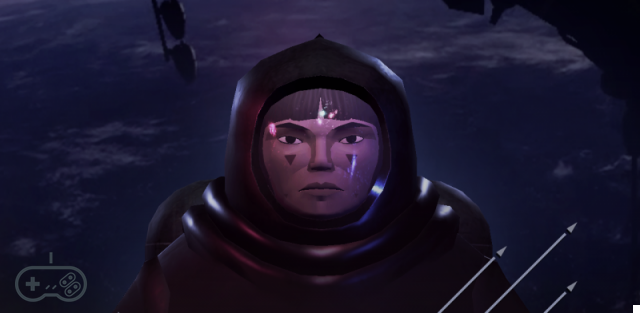
As the introduction should have made you understand, JETT: The Far Shore is focused on the exploration of what we can consider a real promised land, on which the inhabitants of the planet of Mei were attracted by the hymnwave, a kind of intergalactic call that guaranteed his salvation. The game starts with a long one tutorial in which we are invited to become familiar with the controls of the JETT, the ultra-technological vehicle that will support us for the entire game. Considering the time that will be spent on it, it is better to keep in mind what is explained to us by our talkative travel companion, who has the task of giving us explanations on anything ... any, even several times on the same thing in the space of a few seconds. At times it can be really nerve-wracking, especially when you understand perfectly what to do and he keeps repeating, but in the early stages it is quite useful.
Our JETT can accelerate, sprint, jump forward, leap into the sky, scan fauna and flora, throw harpoons to collect objects, animate or inanimate, light up the night with powerful beacons and protect us in various ways with shields and others items that can be added to the basic equipment as the missions pass. Do not expect ferocious shootings or who knows what other form of extreme violence because our scouts have been educated to respect the planet they want to move to and not to destroy its natural beauty.
At best, you can scare the casual attackers with a jump of the JETT, or distract them with some stratagem related to the knowledge of the planet, but that's it. In this regard, it is interesting to note that the environment was designed to appear as a large ecosystem, in which all the elements are related in some way to each other, even if only conceptually. You can rest assured that for every predator that runs after you, be it small, large or mammoth, there will certainly be somewhere a natural element of compensation that will put it out of action if exploited correctly.
In addition to whizzing on the JETT, from time to time Mei may or will have to go ashore, either to rest, or to do some homework. Actually the sections on foot, strictly in the first person, they serve above all to allow the player to deepen Mei's relationship with the other characters, with whom he can speak through a dialogue system based on the choice of topics, and to advance the story with purely narrative moments, were also simple sequences of connection between the missions.
Gameplay
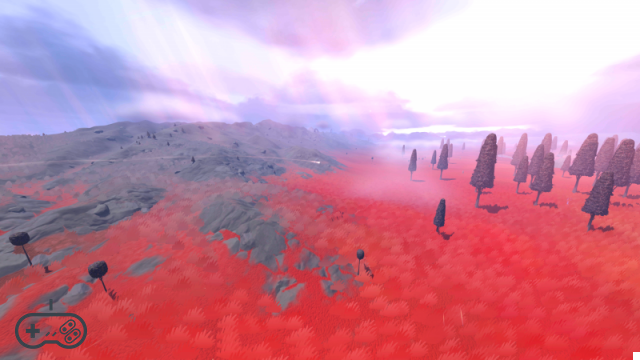
JETT: The Far Shore works when you are in the vehicle and whiz around the game world at full speed, avoiding obstacles and exploring the environment. Running on the water trying not to overheat the engines, or jumping on the dense vegetation of a forest, or even speeding through a vast desert area, are all moments that have their own intrinsic value due to the artistic and stylistic choices that characterize the game, which they enhance the moments of detachment and abandonment to the very flow of gameplay. Too bad there is always someone to tell us what to do, or to remind us. It is also a pity that, especially in the more intricate areas (those with more luxuriant vegetation), it often ends up stuck somewhere and that sometimes it takes more than a few minutes to get out of the way.
The standard mission of JETT: The Far Shore is: reach the indicated area and explore it. In reality there are no real ones quest: the game is divided into macro missions, all structured in sub-sections with different tasks to perform. For example, you can go to the discovery of a new biome and on the way you can stop to pick up a particular object or to examine something that has been discovered while traveling.
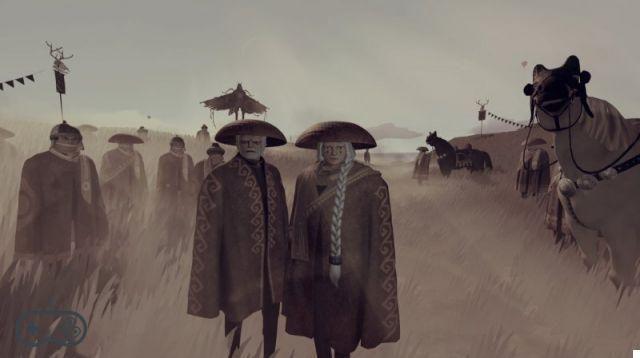
From this point of view the authors have done everything to give the idea of being faced with organic situations, that is determined by the natural turn of events, in order to avoid the fetch quest effect of similar titles. Sorry that sometimes they have not regulated certain situations well, creating particularly annoying dead moments. For example in some cases we will be asked to examine an area by scanning everything that is present and we will be given a time limit to do so. Well, while managing to find everything before the timer expires, you will still have to wait for it to run out before you can continue, with holes sometimes lasting several minutes to fill going around doing practically nothing.
The steps on foot, on the other hand, can be described as simple walking simulator. At most Mei can shoot, to accelerate his movements, and interact with fixed hot spots but, as already mentioned, we are faced with purely narrative moments, in which the deepest and mystical nature of the game emerges.
Surface realization
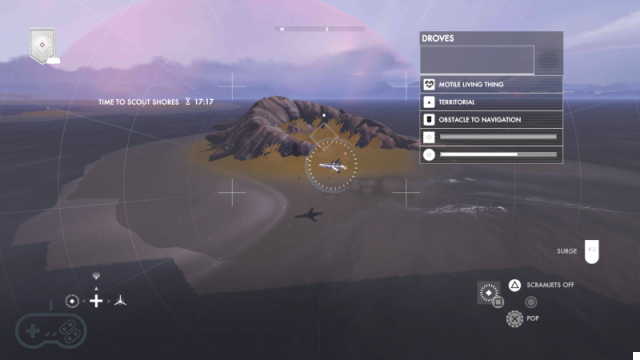
The main problem with Jett the Far Shore is that it doesn't have a clear idea of what it wants to be and doesn't do much of what it sets out to do well. On the one hand there is the narrative game, which occupies an immense space on the stage, but not exclusive, on the other there are various mechanical which basically seem like trappings put there just to justify the fact of being in front of a video game and which turn out to be really superficial, especially in a title where to be honest there is not much to do, apart from JETT. Sometimes it seems as if they were added in the race just to have something more to offer the player, without having a decisive impact on the gameplay. In the long run, not only do they turn out to be superficial in their execution and almost completely superfluous, but they often end up being counterproductive to the rhythm, because they distract from the narrative and have no relevant specificity, other than that of making us waste some time and rendering longer than the missions that could have been completed in a much more agile way.
Paradoxically, if the developers had limited themselves to letting us drive the Jett at full speed, without having to worry about scans or carrying out missions that are often more time-consuming than exciting, the story would have benefited from it, which instead turns out to be fragmented and less compelling, enough to drag towards the end in a tired and predictable way.

The Superbrothers are masters of creating great atmospheres through one narrative style refined, which is sublimated by an aesthetic vision of the original game world and, at times, unsettling. Unfortunately in this case they sinned a lot in the ability to give their work a wider breath. To say, Superbrothers: Sword & Sworcery EP, their previous title, worked well because it never tried to transcend the experience it aimed to offer, remaining anchored in its vision for the duration of the adventure. Here we perceive greater performance anxiety, which ends up leaving us dumbfounded on more than one occasion.
Moreover, despite being in front of an open world, JETT: The Far Shore is spotted by one linearity castrating. But let's try to explain: after beating the game for the first time, we restarted a game with the knowledge already acquired. Our goal was to force the system to see if we could change something or, at least, anticipate the times. The result left us dumbfounded. You pass the tutorial, which as such can only be didactic and carved in stone, but from the second mission onwards we tried to do things differently from the first game, without obtaining results. For example, we knew we had to get an attacker's attention in a certain way, but we couldn't do that until the game gave us permission.
Artistic side
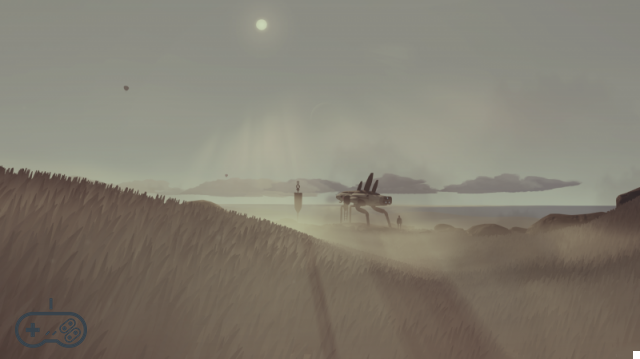
Strangely JETT: The Far Shore is also controversial from one point of view artistic. On the one hand there is the aesthetic part, not very rich, but composed in such a way as to be fascinating, thanks to the melancholy colors that permeate the entire game, to the simple but strongly expressive 3D models, to the delicate and never strenuous soundtrack and to a direction of the intermission sequences that greatly enhances the minimalism of the staging. On the other hand, however, there is a narrative made up of dialogues that are not exactly exciting and of characters who are anything but memorable, so it is difficult to feel the slightest empathy, so much so that when the ending arrives you end up hearing almost no emozione, despite the upheaval it entails.
Probably the general coldness is desired, but it becomes counterproductive when the characters begin to express feelings and require participation from the viewer. Attention, because the game is undoubtedly fascinating as an aesthetic experience, so much so that we can consider it one of its strengths, but at the same time it always seems to want to keep its distance, to the point that, once the adventure is over, what remains is the impression of having made a long ride on the JETT in a world of unspeakable beauty, which however, on closer inspection, has left us only a few postcards to send to relatives as a testament to its existence.
Comment
Tested version PC Windows Digital Delivery Epic Games Store, PlayStation Store Price 23,99 € Resources4Gaming.com5.0
ReadersSV
Your voteJETT: The Far Shore is a weird title, which sins due to superficial gameplay mechanics and an incredible eagerness to fill empty moments with something meaningful, never fully succeeding. It works from an artistic point of view, but is unable to involve in its history; it is a game focused on the mobility of the JETT, but creates moments of disarming slowness; goes to great lengths to present its open world as alive, but it oppresses the player with its enormous linearity. Frankly it's really hard to recommend it lightly, despite having its moments.
PRO
- Aesthetically successful
- Running on the JETT is not bad
- Some mechanics are really superficial
- The narrative part does not involve
- Silence the co-pilot!





